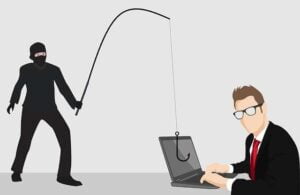Nowadays, the internet isn’t a safe place as on a daily basis we read about new ways how internet criminals are trying to exploit people. Hacking, cyber-stalking, identity theft, malicious software, child soliciting are just some of the gruesome crimes known to the internet world. Only a few weeks ago Facebook was in the middle of the investigation about the data breach, where company Cambridge Analytica acquired 50 million Facebook profiles and personal data information from a researcher in 2014.
Here’s the deal:
Identity theft is a severe problem as it involves the impersonation of another person in order to gain an unfair advantage. Identity theft can tarnish your reputation, internet criminals can rip you off your money, and in the end, they can land you in trouble. Just recently hackers tried another “interesting” scam. In the middle of the Royal Weeding Weekend, they came up with “The Royal Name Game”, where they asked users on the site to reveal a grandparent’s name, the street they grew up on, and the name of one of their pets in exchange for providing participants with a “The Royal Guest Name”. This kind of questionnaire is everything but fun as they reveal answers to the most commonly used questions to the hackers.
Where is the danger?
Online identity theft can happen anywhere and anytime, but there are several places where you should be extra careful and think twice before you give any personal data.
Social Media
Social media and social networks are the places where we connect with other people. On social media, we can post pictures of ourselves, our family and friends, photos of the food we eat, or places we visit, for the world to see.
Social networks function on the personal data that users provide. Those websites have unregulated nature, which provides cybercriminals with a nice playground for their criminal activities. The world biggest social network recently had a problem with data breaches and stolen data from their servers.
Famous people often have a problem with other people creating fake accounts in their names. For example, back in 2011, the former governor of Alaska Sarah Palin’s official Twitter account was breached.
Phishing via Email

This is the email scam where cyber criminals “fish” for your personal data, usually account numbers, passwords, and other confidential information.
This kind of email appears to have come from a well-known person or organization like your bank or company where you work. The phishing email will most likely contain a link that will take you to a fake lookalike site where you will insert your account details and that way the hacker will have all the information he needs.
Shopping Online
Shopping online is very convenient. However, each time you open a new account or shop online, there is a chance that someone is gathering your information to steal your identity.
You can, however, help shield your identity by taking a few preventative measures whenever you go online, whether you’re on your desktop at home or using your mobile device somewhere outside. Here are some tips that can help keep you safe:
Don’t shop over public Wi-Fi spots,
Use strong passwords,
Don’t click on links,
Don’t save your credit card details etc.
The key effort to help prevent identity theft when shopping online circles around increasing your cyber scam intelligence, keeping your devices properly protected and updated, and making sure you have authorized all credit card activity. Also, it is always good to check what online shops are safe and credible. Websites like Online Best Stores help you find reliable information about online shops.
Online Casinos
Online gaming is a rapidly growing industry. The global online gambling market is expected to reach $1 trillion by 2021. Aside from the adrenaline rush, many players love to gamble anywhere and anytime, and that can be potentially dangerous.
As with so many other industries, growth comes with a price – increased cybercrime. Identity spoofing is the biggest threat to this industry as fraudsters look to take advantage of players. Players need to take special care when they choose the gambling site they want to play in. When users play at an untrustworthy gambling site, they put themselves at serious risk. The best thing users can do is to avoid blacklisted sites and to play only at online casinos that have a reputation for reliable banking and fair gaming.
Nowadays, online casinos are tested and examined by several unbiased sources, which help players choose the best online casino to play at. Make sure to use casino review sites like Casino Guru to find a trustworthy and reputable casino, in which your money and information will be safe.
Fake Online Dating Scams
Online dating apps are very popular these days, and they are a great way to meet your future life partners. Cybercriminals have abused this scamming method for years by using online dating services. They improved their approach just by testing the potential victims’ reactions.
So to avoid being a victim of this kind of internet scam, it is wise to use some of the recommended security tips for defensive online dating. Moreover, if you suspect or fear that you have had your identity stolen, act fast and contact your bank and go to the nearest police station.
What’s the bottom line?
The first and most important thing is not to reveal any personal information to unknown people or organizations on the internet. Also, it is crucial to secure your social media accounts, and use complex passwords. Making a unique, unpredictable password is the key to your internet safety. Creating a secure password isn’t such a hard task, and there is a really interesting article on how to do it right.
Another important thing is to deposit your money only with reputable and encrypted websites. Nowadays, buying stuff on the internet is as easy as it can be. You can buy anything from a new protein shake to used alloy rims for your car. Also, you can purchase and play video games, gambling in an online casino or take the internet seminar and gain a certificate in SEO writing. All of those things are just a few clicks away from you. When you pay for things over the internet, you should be aware that many of the websites aren’t secure and your data can be stolen easily.
It takes just a moment to lower your guard and give your personal data to the unwanted source. Royal Wedding, your favorite TV show or Live Stream of the football game will distract your mind, and you can be in trouble. Make strong passwords, don’t trust unsecured and unknown sources, and do not share your personal data lightly. That way you should be safe.

